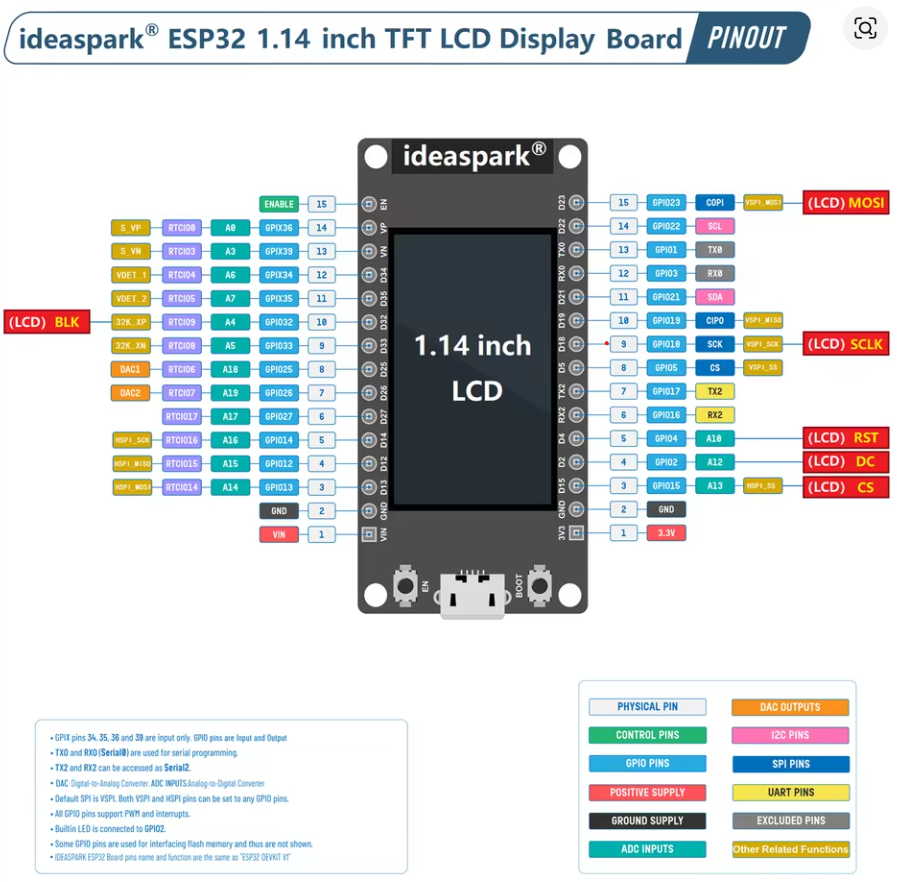PageESP32-WROOM-32S 32d
Board description
The Dual Core 30pin ESP32-WROOM-32S 32d is compatible with the Arduino IDE. To get started, you'll need to install the ESP32 board definitions through the Arduino Board Manager. Here’s how:
-
Install the Board Package:
In the Arduino IDE, open File > Preferences and add the following URL to the “Additional Boards Manager URLs” field:https://dl.espressif.com/dl/package_esp32_index.json -
Use the Board Manager:
Go to Tools > Board > Boards Manager, search for “ESP32,” and install the package provided by Espressif. -
Select Your Board:
Once installed, select the appropriate ESP32 board from Tools > Board. Your Dual Core ESP32-WROOM-32S should appear in the list, allowing you to program it using the familiar Arduino environment.
With these steps, you can leverage the Arduino IDE to develop and upload code to your ESP32 board.
Modulenaam in Arduino IDE: ESP32 Dev Module
┌──────────────────────────────────┐
│ ideaspark®Ideaspark® ESP32 Board1.14" LCD │
│ 1.14" TFT LCDDisplay Board │
│ │
Left Side │ │ Right Side
──────────────────────┤ ├────────────────────────
EN──────
(15) EN ─────▶│ ENABLEEN (23)/ Enable │◀──── GPIO23 →VSPI_MOSI (LCD MOSI / VSPI MOSI
GPIO13MOSI)
(14) GPIO36 ─────▶│ A0 / RTC10RTCIO08 (22)│◀──── GPIO22 →SCL (I2C SCL
GPIO12Clock)
(13) │GPIO39 A1 / RTC9 (01) TX0 → USB Serial TX
GPIO27 (12) │ A2 / RTC17 (03) RX0 → USB Serial RX
GPIO33 (11) ─────▶│ A3 / RTC8RTCIO03 │◀──── GPIO1 TX0 (19)USB GPIO19Serial →TX)
VSPI(12) MISOGPIO34 GPIO32─────▶│ A6 / RTCIO04 │◀──── GPIO3 RX0 (USB Serial RX)
(11) GPIO35 ─────▶│ A7 / RTCIO05 │◀──── GPIO21 SDA (I2C Data / LCD BLK)
(10) GPIO32 ─────▶│ A4 / RTC9RTCIO09 │◀──── GPIO19 VSPI_MISO (18)SPI GPIO18 → LCD SCLK / VSPI SCK
GPIO35MISO)
(9) GPIO33 ─────▶│ A5 / RTC6RTCIO08 │◀──── GPIO18 VSPI_SCK (17)LCD GPIO17 → TX2
GPIO34SCLK)
(8) GPIO25 ─────▶│ A6DAC1 / RTC4RTCIO06 │◀──── GPIO5 VSPI_SS (16)SPI GPIO16 → RX2
GPIO39CS)
(7) GPIO26 ─────▶│ A7DAC2 / RTC3RTCIO07 │◀──── GPIO17 TX2 (04)UART2 GPIO4 → LCD DC / A10
GPIO36TX)
(6) GPIO27 ─────▶│ A8GPIO / RTC0RTCIO17 │◀──── GPIO16 RX2 (00)UART2 GPIO0 → LCD RST
GPIO25RX)
(5) GPIO14 ─────▶│ DAC1 (15) GPIO15 → LCD CSHSPI_SCK / A13RTCIO16 GPIO26│◀──── GPIO4 A10 (LCD RST)
(4) GPIO12 ─────▶│ DAC2HSPI_MISO (02)/ RTCIO15 │◀──── GPIO2 →A12 Built-in(LCD LED
GPIO14DC)
(3) GPIO13 ─────▶│ A14HSPI_MOSI / HSPICLKRTCIO14 │◀──── GPIO15 A13 (GND)LCD GND → Ground
GPIO15CS)
(2) GND ─────▶│ A15Ground /│◀──── HSPICS0GND (3V3)— 3.3V → Power Out
VINGround
(1) VIN ─────▶│ Power In (5V) │◀──── 3.3V — Power Out (3.3V)
───────
GND (0) │ Ground
───────────────┤ ├──────────────────────────────
│ USB-C Port │
└──────────────────────────────────┘

